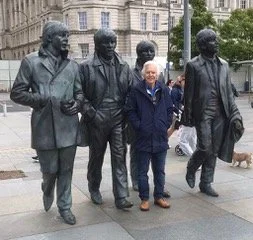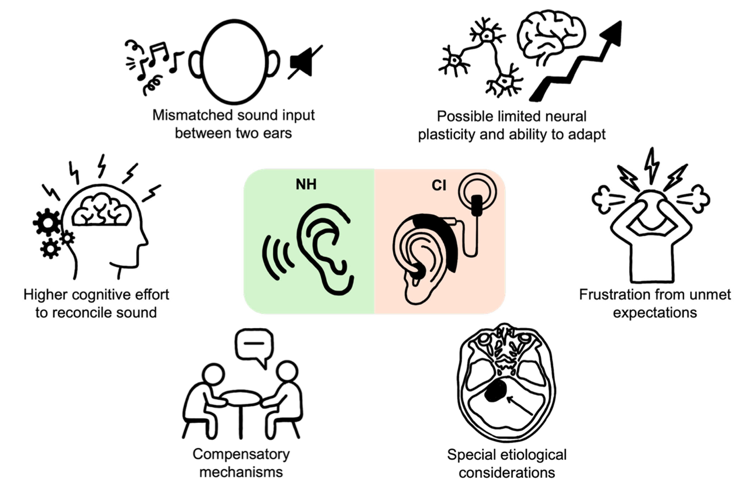By Kathi Mestayer
(Desplácese hacia abajo para ver la traducción al español.)
Barry Johnson, Ph.D., and friends.
Barry Johnson, Ph.D., a retired educational psychologist in Sheffield, England, reached out to Hearing Health Foundation to share his experiences and insights from dealing with tinnitus.
Barry describes the onset of his tinnitus as “a gradual process that started before Covid, but it was after my third Covid infection that I sensed a significant, rapid deterioration.
“It was not a big surprise. My father and mother both had it, and there were other hearing issues in the family. My tinnitus is like being on a plane—a constant sound at one frequency.”
Initially Barry tried therapy that involved listening to white noise through headphones, but it didn’t help.
Then he started learning to play the guitar.
“I joined a folk music group where we perform, sing, and engage with other musicians, sharing our experiences. As I began learning, and performing, music, there was a significant decrease in my tinnitus symptoms,” Barry says.
“When I’m actively focusing on the sounds, the tempo, and the lyrics, the tinnitus noise goes away.”
Barry also began listening to music on his cellphone using Bluetooth through his hearing aids.
“That was a revelation to me. I would just be walking down the street, and the music would really engage my attention and quiet the tinnitus.
“Part of the positive effect is that I get to choose the music I’m hearing. It’s not just music playing in a public space. It’s what I enjoy listening to.”
“In contrast,” he says, “when I’m in a very quiet setting, like going to sleep, the tinnitus can come back. I deal with it by using a behavioral approach, such as imagining myself floating away into the first stage of sleep.”
Barry’s tinnitus strategies have other benefits as well. “There’s a lot of overlap between managing tinnitus and dealing with the challenges of aging,” he says. “Socializing, paying active attention, learning new things, and physical activity are all things that can help with both.”
Learning to play music, socializing, and performing with other musicians is helping Barry manage his tinnitus and mitigate the effects of the aging process. In fact, music’s beneficial effect on tinnitus patients has been documented in this 2023 systemic review and meta-analysis in the journal Medicine.
Barry summarizes it this way: “This is my retirement plan—addressing the aging process, and kicking tinnitus out the door.”
Hearing Health magazine staff writer Kathi Mestayer is the vice chair of the Greater Richmond Hearing Loss Association, and has served on the advisory board of the Virginia Department for the Deaf and Hard of Hearing.
La Música Puede Ser una Estrategia para Manejar el Tinnitus-y el Envejecimiento
Por Kathi Mestayer
Barry Johnson, Ph.D., un psicólogo educacional jubilado de Sheffield, Inglaterra, se puso en contacto con la Hearing Health Foundation para compartir sus experiencias y conocimientos sobre cómo lidiar con el tinnitus.
Barry describe la aparición de su tinnitus como “un proceso gradual que comenzó antes del Covid, pero fue después de mi tercera infección por Covid que sentí un deterioro rápido y significativo.”
“No fue una gran sorpresa. Mis padres lo tenían, y había otros problemas de audición en la familia. Mi tinnitus es como estar en un avión: un sonido constante en una sola frecuencia.”
Al principio Barry probó una terapia que consistía en escuchar ruido blanco a través de auriculares, pero no ayudó.
Luego comenzó a aprender a tocar la guitarra.
“Me uní a un grupo de música folclórica donde actuamos, cantamos y nos relacionamos con otros músicos, compartiendo nuestras experiencias. A medida que comencé a aprender y a interpretar música, mis síntomas de tinnitus disminuyeron significativamente,” dice Barry.
“Cuando me concentro activamente en los sonidos, el ritmo y la letra, el ruido del tinnitus desaparece”.
Barry también comenzó a escuchar música en su teléfono celular usando Bluetooth a través de sus audífonos.
“Eso fue una revelación para mí. Simplemente caminaba por la calle y la música captaba mi atención y calmaba el tinnitus.”
“Parte del efecto positivo es que puedo elegir la música que escucho. No se trata solo de música que suena en un espacio público. Se trata de aquello que disfruto escuchar.”
“En cambio”, dice, “cuando estoy en un ambiente muy tranquilo, como al dormir, el tinnitus puede volver. Lo afronto con un enfoque conductual, como imaginarme flotando hacia la primera fase del sueño”.
Las estrategias de Barry para el tinnitus también tienen otros beneficios. "Existe una gran coincidencia entre el manejo del tinnitus y la superación de los desafíos del envejecimiento", afirma. "Socializar, prestar atención activa, aprender cosas nuevas y la actividad física son medidas que pueden ayudar con ambos".
Aprender a tocar música, socializar y tocar con otros músicos está ayudando a Barry a controlar su tinnitus y a mitigar los efectos del envejecimiento. De hecho, el efecto beneficioso de la música en pacientes con tinnitus se ha documentado en una revisión sistemática y metaanálisis del 2023, publicados en la revista Medicine.
Barry lo resume así: “Este es mi plan de jubilación: abordar el proceso de envejecimiento y erradicar el tinnitus”.
Kathi Mestayer, redactora de la revista Hearing Health, es la vicepresidenta de la Greater Richmond Hearing Loss Association y ha formado parte del consejo asesor del Departamento de Virginia para personas sordas y con dificultades auditivas.
Traducción al español realizada por Julio Flores-Alberca, octubre 2025. Sepa más aquí.








An audiologist shares the science behind Halloween’s eeriest noises.